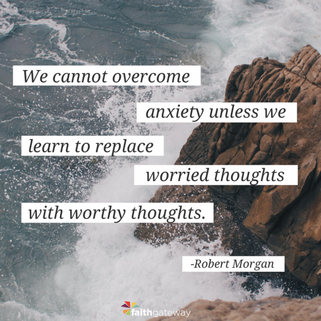
Be careful how you think; your life is shaped by your thoughts. — Proverbs 4:23 GNT
In, Beware Of Ministry Burnout, my first post on burnout I said that the signs that you are heading towards a ministry burnout include; experiencing unexplained stress, depression and/or anxiety. When we start to see those signs we need to remember the times that we enjoyed our ministry. The times that we couldn’t wait to spend time with God in prayer, reading the Bible, and spending time with other believers. Those times that we would spend hours getting ready to minister. Those times that we couldn’t sleep in the anticipation of seeing God move to save the lost, deliver those in boundage, and heal the sick. We need to remember Paul’s exhortation to think only of the good things.
Philippians 4:8 (NLT) And now, dear brothers and sisters, one final thing. Fix your thoughts on what is true, and honorable, and right, and pure, and lovely, and admirable. Think about things that are excellent and worthy of praise.
In an article on stress management the Mayo Clinic staff said;
Positive thinking helps with stress management and can even improve your health. Practice overcoming negative self-talk ....
Indeed, some studies show that personality traits such as optimism and pessimism can affect many areas of your health and well-being. The positive thinking that usually comes with optimism is a key part of effective stress management. And effective stress management is associated with many health benefits.
Researchers continue to explore the effects of positive thinking and optimism on health. Health benefits that positive thinking may provide include:
- Increased life span
- Lower rates of depression
- Lower levels of distress
- Greater resistance to the common cold
- Better psychological and physical well-being
- Better cardiovascular health and reduced risk of death from cardiovascular disease
- Better coping skills during hardships and times of stress
Thinking good things even works for non-believers and skeptics just think of what it will do for you. When you only think of the the good things you allow the fruit of the Spirit to flourish in and through you.
Galatians 5:22-23 (NLT)22 But the Holy Spirit produces this kind of fruit in our lives: love, joy, peace, patience, kindness, goodness, faithfulness,23 gentleness, and self-control. There is no law against these things!
When we do this we are able to push those feelings of anxiety, stress, and depression into the background and focus on the things of God the perfect antidote for ministry burnout symptoms.
Consider the suggestion, of Robert Morgan in his book Worry Less, Live More, to practice thinking good thoughts those thoughts that are true, honorable, right, pure, lovely, and admirable.

excerpted from Worry Less, Live More by Robert Morgan
Think good thoughts
Whatever is true… noble… right… pure… lovely… admirable… excellent… praiseworthy — think on these things. — Philippians 4:8 (KJV)
When our minds are overtaken with worry, distress, or discouragement, there’s only one thing to do. We have to remember.
We have to call to mind the truths we need. We have to take control of our thoughts and stop listening to ourselves and start talking to ourselves. We have to preach to ourselves, lecture ourselves, exhort ourselves. In short, we must go on to the next verse in Paul’s prescription for a better life — the practice of thinking. Philippians 4:8 says:
Finally, brothers and sisters, whatever is true, whatever is noble, whatever is right, whatever is pure, whatever is lovely, whatever is admirable — if anything is excellent or praiseworthy — think about such things.
Out of the thirty-two words in that sentence, only one is an action verb, and it’s the key word of the verse and the sole imperative — think.
In terms of his natural personality, I believe the apostle Paul was, to some degree, a bundle of nervous energy, absorbed in his work, and subject to passionate concern.
His anxiety in Troas had short-circuited his ministry there, though God had opened great doors in that city. But Paul was a devoted student of the Hebrew Scriptures, and it’s clear he searched the books and parchments of the Old Testament for a greater acquisition of the peace of God. Perhaps in his studies he came across these words:
Be careful how you think; your life is shaped by your thoughts. — Proverbs 4:23 GNT
You will keep him in perfect peace, Whose mind is stayed on You, Because he trusts in You. — Isaiah 26:3 NKJV
Search me, God, and know my heart; test me and know my anxious thoughts. See if there is any offensive way in me, and lead me in the way everlasting. — Psalm 139:23-24
If we have anxious thoughts we’ll be anxious people, because what we think is the most important thing about us.
We are what we think, and our lives, attitudes, feelings, reactions, results, failures, successes, and personalities are formed by the strands of thought that tie our brain cells together like baling wire. This is so self-evident it’s been at the heart of philosophy and religion from the beginning of human civilization.
Even non-Christians know this. The Hindus taught, “Man becomes that of which he thinks.” The Buddha said, “The mind is everything: what you think you become.” Marcus Aurelius said, “Your life is what your thoughts make it.” Descartes wrote: “I think, therefore I am.” The nineteenth-century Unitarian preacher William Channing wrote: “All that a man does outwardly is but the expression and completion of his inward thought.”
Ralph Waldo Emerson summed it up nicely, saying, “A man is what he thinks about all day long.”
William James laid the foundation for today’s motivational movement and positive-thinking literature with these simple words: “The greatest discovery of my generation is that human beings can alter their lives by altering their attitudes of mind.”
The homespun British philosopher James Allen wrote:
A man is literally what he thinks, his character being the complete sum of all his thoughts. . . . Good thoughts bear good fruit, bad thoughts bad fruit. . . . Let a man radically alter his thoughts, and he will be astonished at the rapid transformation it will effect in the material conditions of his life. Men imagine that thought can be kept secret, but it cannot; it rapidly crystallizes into habit, and habit solidifies into circumstances.
Allen added, “As the physically weak man can make himself strong by careful and patient training, so the man of weak thoughts can make them strong by exercising himself in right thinking.”
That’s Paul’s point in Philippians 4:8. Many of the men I’ve just quoted weren’t committed to biblical truth, but by sheer deduction they discovered a biblical truth so self-evident it can’t be ignored. As Proverbs 23:7 puts it,
For as he thinketh in his heart, so is he. — KJV
This is an inescapable biblical fact, and Philippians 4:8 is one of the Bible’s greatest declarations about the power of our thoughts in molding our personalities and moving us into realms of God’s peace.
To live more and worry less, we must think and we must think rightly, on the right things, at the right time, on the right wavelengths, with our antenna tuned to the frequency of God’s truth.
We cannot overcome anxiety unless we learn to replace worried thoughts with worthy thoughts, thoughts that come directly from the mind of the God of peace. That requires thinking on things that are true, noble, lovely, and praiseworthy.
Thinking is an activity that’s fallen on hard times. We’re too busy to think, and our minds are congested with noise. It’s hard to meditate with our phones clamoring like calliopes, incoming messages arriving like missiles, and headsets blaring like the Tower of Babel.
We don’t ride horses into town now. Our work isn’t undertaken in quiet fields, disturbed by nothing beyond the murmur of the wind or the distant baying of a dog. We no longer read by the flicker of candlelight or the glow of a fireplace. All that was lost long ago in the Industrial Revolution; now the Information and Technology Revolutions instantly deliver the cacophony of the world straight into our eardrums via a billion speakers and earphones. We rush through traffic like salmon bolting upstream for spawning. We’re bombarded by noise and besieged by stimuli. Surround sound is a way of life, and lost to us — without true spiritual effort — is the spirit of Isaiah 30:15:
In quietness and confidence shall be your strength. — NKJV
Or Psalm 46:10:
Be still, and know that I am God.
When we learn to take time for thinking, and when we learn to think in the right way, the benefits come over us like a metamorphosis. This once happened to E. Stanley Jones. Though he had gone to India as a missionary with visionary passion, his energy had evaporated amid unbearable heat, hostility, and anxiety. He collapsed, and even prolonged rest failed to restore him. His nerves were shot. He resembled the apostle Paul at Troas.
One night in the city of Lucknow, while praying, Stanley Jones suddenly felt the Lord speaking to him. Though not audible, the Lord’s voice almost seemed so. Jones sensed these words: Are you yourself ready for this work to which I have called you?
“No, Lord, I am done for,” Jones replied. “I have reached the end of my resources.”
The Lord seemed to reply, If you will turn that over to Me and not worry about it, I will take care of it.
“Lord,” Jones said, “I close the bargain right here.” At that moment a great peace settled into his heart and pervaded his whole being:
I knew it was done! Life — Abundant Life — had taken possession of me. I was so lifted up that I scarcely touched the road as I quietly walked home that night. Every inch was holy ground. For days after that I hardly knew I had a body. I went through the days, working far into the night, and came down to bedtime wondering why in the world I should ever go to bed at all, for there was not the slightest trace of tiredness of any kind. I seemed possessed by life and peace and rest — by Christ Himself. - From The Theosophical Society in America, The Theosophical Quarterly, 25 (1927
Jones labored on for decades, serving more than forty years in India, preaching around the world — sometimes three times a day, writing a dozen books, and becoming one of the most famous missionaries of his generation. From his evening encounter with the Lord at Lucknow until his death in January 1973, E. Stanley Jones lived in the glow of the sufficiency of Christ Himself, never forgetting the Lord’s promise, “If you turn that over to Me and not worry about it, I will take care of it.”
If you’ll listen quietly and in the stillness of His presence, the Lord is whispering the same words to you. And He tells you to think about such things.
Excerpted with permission from Worry Less, Live More by Robert Morgan, copyright Robert J. Morgan
Worry, which is essentially a strain of fear, is a rational response to real pressures and problems. Life is harder than we expect, and even the Lord Jesus, the Prince of Peace Himself, admitted, “Each day has enough trouble of its own” (Matthew 6:34). He said, “In this world you will have trouble” (John 16:33). On one occasion, He even said, “Now my soul is troubled, and what shall I say?” (John 12:27). Our souls are easily troubled. The world and its trials seem to only increase.
In nearly forty years of pastoral counseling, Rob Morgan has seen a lot of changes in our culture. People are anxious, and everyone seems increasingly tense and taunt. We’re overextended, running on empty, and often running late. We’re worried and we’re weary. One moment we’re alarmed about global politics and the next we’re frustrated with a clogged commode or a cranky boss. Stress can have a way of keeping us on pins and needles from dawn to darkness.
In this book Pastor Morgan leads the way through the investigation of the Bible’s premier passage on the subject of anxiety. Philippians 4:4–9 is God’s most definitive word about overcoming anxiety and experiencing His overwhelming peace. Dissecting the following eight practices this vital passage promotes will help you to wage war on worry:
- The Practice of Rejoicing
- The Practice of Gentleness
- The Practice of Nearness
- The Practice of Prayer
- The Practice of Thanksgiving
- The Practice of Thinking
- The Practice of Discipleship
- The Practice of Peace
Rob Morgan is the pastor of The Donelson Fellowship in Nashville, Tennessee, where he has served for more than thirty years. He is a bestselling and Gold-Medallion winning writer of more than twenty books with four million in print circulation. Rob has written articles for numerous publications and has appeared on national television and radio shows. He and his wife, Katrina, have three daughters and twelve grandchildren.
By Rick Warren
“Do not conform to the pattern of this world, but be transformed by the renewing of your mind”(Romans 12:2 NIV).
If you want to have lasting change in your life, you need to refocus your mind.
Specifically, you need to change your thought patterns away from what you don’t want to focus on and toward what you do want to focus on. Because whatever you focus on is what you move toward.
Today’s verse gives us the blueprint to change our thought patterns:
How does this happen? The Bible tells us in Ephesians 4:22-24 “to put off your old self, which is being corrupted by its deceitful desires; to be made new in the attitude of your minds; and to put on the new self, created to be like God in true righteousness and holiness” (NIV).
This means you are going to have to do some putting off and you are going to have to do some putting on — and the putting off has to happen before the putting on. It’s just like trying on clothes in a department store. Before you can try on the new stuff, you have to take off the old stuff.
You’re going to have to let go of the old attitudes, the old thought patterns, the old images that you’ve been living with so you can put on the new garments God has for you.


 RSS Feed
RSS Feed